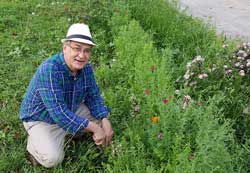 • IDRA Newsletter • March 2016 •
• IDRA Newsletter • March 2016 •
This year, the IDRA Newsletter is highlighting our staff’s varied and diverse talents and backgrounds. Aurelio Manuel Montemayor, M.Ed., is an IDRA senior education associate and lead trainer. He grew up on the border in Laredo, Texas, and began his teaching career in 1964, also on the border in the San Felipe High School as an English teacher in the San Felipe neighborhood of Del Rio. His original plans to become a published writer were sidetracked by his immediate and permanent love of teaching. His pedagogic skills and development were central to his journey through becoming a VISTA trainer, a co-founder of an independent Chicano college and, during the early 1970s, proud to meet with Paolo Freire, who had been an inspiration for his education work in the community. Aurelio came to IDRA in 1975 as a teacher trainer and developed key training-of-trainer tools for educators and others as exemplified in the WOW! Workshop on Workshops. As point person for family engagement in education, especially poor, minority, English learners and recent immigrant families, he has led IDRA’s Family Leadership in Education model that is currently embodied in “Comunitarios” and the current i3 PTA Comunitario project, funded by the U.S. Department of Education.
In the last 20 years, Aurelio has become a persistent planter of Texas wildflowers in his yard, which has led to somewhat difficult relationship with the code enforcement division of the City of San Antonio. A late advocate of Lady Bird Johnson’s campaign in support of the natural growths in Texas, and more probably in line with his decision to be a vegetarian almost 20 years ago (“not from any deep health or ethical reasons but to be a thorn in the side of a very carnivorous environment”), he has shown an aversion for neatly cut lawns and the grasses cultivated in most middle class neighborhoods. In the online story, “The Thorny Path of the Non-compliant Xeriscapist,” you can read a fuller description and more passionate expression of his campaign and crusade.
Comments and questions may be directed to IDRA at comment@idra.org.
[©2016, IDRA. This article originally appeared in the February 2016 IDRA Newsletter by the Intercultural Development Research Association. Permission to reproduce this article is granted provided the article is reprinted in its entirety and proper credit is given to IDRA and the author.]



